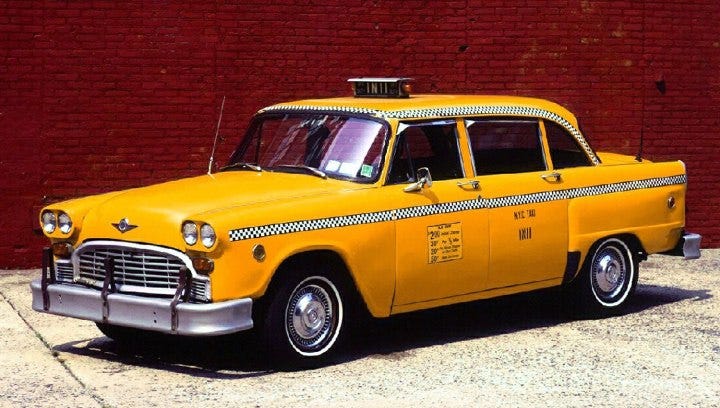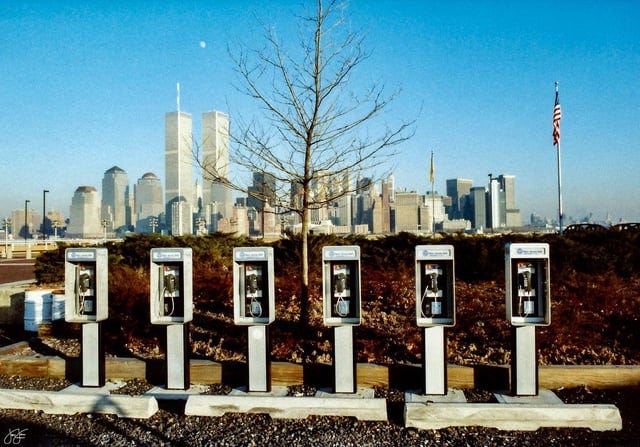While hailing a cab one morning in the early aughts, it suddenly struck me that I had not seen one of those big Checker cabs in a while. In case you do not remember or in the instance that you are too young to know, they were the large square inventions with two rear-facing rumble seats in the back and a black and white checked stripe along the side. It was easy for five, even six people to pile into the spacious machine and speed off to a destination. They were especially useful during long gay evenings of barhopping. One of the rumble seat occupants would slide open the thick plexiglass partition and repeat or call out the destination for the driver.
But the Checkers felt lonely when occupied alone. Legs stretched out touching nothing and the rumble seats tucked up like Murphy beds could make any morning feel like a dreary Monday.
I didn’t know on that morning that the last Checker cab had been retired on a Monday, July 26, 1999. But my recognition of their absence caused me to reflect on the process of change over time.
Interesting that we feel stationary and safe while our earth whirs around the sun at the breakneck speed of 67,000 miles per hour and rotates on its own axis at about 1,037 miles per hour. When I spoke to B., my husband, recently, about why we don’t feel that movement, I proposed that it had to do with the size of the earth and the minuscule dimension of humanity.
“Uh-uh,” he countered. “We don’t feel it because the speed is consistent.”
Transformation circles around us, at a high speed, in the same way. We don’t notice it until something wakes up yesterday, our mind slows down and peddles backwards. We take note that there are no Checker cabs, a small eatery has once again changed names, or that public telephones have completely disappeared from the airports and street corners.
I even remember the very last call I made on one of those phones, probably because I made the call on the cusp of the tipping point; the cultural icon was still in the braking process but not quite stopped. I came off the plane at LaGuardia with a cell phone that was totally dead. In a pre-Uber world, I needed to call my scheduled car service to confirm my door pickup locale. In a panic, I started searching for a public phone, taking note that only two or three lonely units were left standing from the long line of phones that formerly occupied the wall at the bottom of the escalator. Standing in front of the measly selection, I searched in my bag for coins and found none. With no change in my handbag, I went panhandling for quarters.
I felt old-fashioned, out of touch and slightly embarrassed as I held out a few dollar bills to the passersby, asking if they could offer some change.
I was next to the last man standing in the vanishing world of public telephones.
It was probably about a year later that I noticed they were all gone.
Stress is what we feel when we stand on the edge of transformation. And on that edge neither the landscape nor the people are routinely equipped to deftly handle the circumstances. There would have been no outlets to charge my phone on the plane or at the airport. There would have been no ritual to turn off the cellphone in preparation for the flight so that I would have had battery juice upon landing.
I had one foot in yesterday and the other in today.
The world speeds on, we’re caught in the momentum, and we don’t even hear the whirring until we have to brake a little and dip back in to just-yesterday’s customs.
The accidental observation or remembrance of a final marker often triggers me to read one of my favorite poems by Ellen Bass again.
What if you knew you’d be the last
to touch someone?
If you were taking tickets, for example,
at the theater, tearing them,
giving back the ragged stubs,
you might take care to touch that palm,
brush your fingertips along the life line’s crease.A friend told me she’d been with her aunt.
They’d just had lunch and the waiter,
A young gay man with plum black eyes,
Joked as he served the coffee, kissed
Her aunt’s powdered cheek when they left.
Then they walked half a block and her aunt
dropped dead on the sidewalk.
Each time I read this poem, I promise myself that I will not just buzz through my moments, but that I will run my fingers across their grain and memorize their feel.
I promise myself that I will not just buzz through my moments, but that I will run my fingers across their grain and memorize their feel.
I swear that I will flashbulb the vivid colors and inhale every aroma. And that I will store the collected passages in a well-ordered cubicle of my mind.
But then an Amazon email arrives that announces a delivery at my doorstep, a friend texts me and changes the time of our dinner, or the bug man rings the doorbell and needs entry to spray the courtyard.
So, by the end of the day, mundane activities have so hijacked my mindshare that I am hard pressed to detail the occurrences.
I start over the next morning with the same quiet time and the same promises.
Some days turn out better than others, depending on the bug man’s schedule and a particular friend’s consistency, but focus appears to be no one’s strong suit these days, and we are often anxious because we feel like we are squandering our precious time.
In Thornton Wilder’s classic play, Our Town, Emily comes back after her death to stand in the kitchen and watch her mother make breakfast. Standing in the corner, as a ghost, unseen and unacknowledged, she begs her mother to look up at her.
“On earth you’re too wonderful for anyone to realize,” she cries. “Do any human beings ever realize life while they live it—every, every minute?”
From my theater seat, last spring, I concluded I could not turn every second into a life-affirming meditation, but I began to gaze differently on my past New-York-minute lifestyle. Time is, after all, only the unbiased and disinterested carrier of our choices. When we ache for news from a loved one, we don’t pine for more wi-fi or more postmen. We yearn to hear the content of their lives.
Time is, after all, only the unbiased and disinterested carrier of our choices.
When I recount the loveliness that Emily in Our Town implores me to consider, it has often been provided by human beings who have converted their hours into a gift of big-heartedness.
Often, the offerings come out of the blue, unexpected.
If my sister had not arrived to help me take my former husband to the hospital and to the burial ground, she would not have been missed, as I believed I could do everything on my own. But I remember, with a clarity that supersedes vivid, my letting go when she walked through my front door. I could, for the first time in years, lean back in the fine leather chair in my living room. I could let someone else talk to the doctors and I could let nothingness invade my space with no guilt. Her presence, 1000 miles away from her own obligations, for over two weeks, along with the subsequent six months of long-distance care, made me feel safe on a terrain that was no longer familiar or predictable.
Now pushing 17 years ago, I can still close my eyes, run my finger along the life line of my palm and feel the presence of my sister.
I have a former colleague who, for years, wrote the Clinique advertising and marketing copy. I loved working with her. I considered her brilliant both then and now. Every time I post an essay, she sends a note of positive support and substance. She was never obliged to comment one way or the other, and because she wasn’t and isn’t, I read her emails three and four times over.
I still meet every morning with a renewed resolve to embrace the significant and to snub the trivial. But I have disposed of at least some of my time-wasting paranoia.
Yes, it’s true that a shot of anxious adrenaline courses through me when the bug man rings the bell. I also have a tendency to lose my patience when B. lets Granny start her saunter through the crosswalk seconds after the cautionary blinking has stopped.
Heart palpitating, tongue sharp enough to cut meat, I am standing on the cusp of my own change.
With one foot in yesterday, the other in today, I run my fingertips along my own lifeline crease.







Blessed to be your friend and to have you for a reader!!
Beautiful Lynne , Flawless thinking, how you craft words ....why, I always read your Substack, put it away and come back to read again and savor your thoughts , perceptions and your humanity .
I do remember the Checker Cabs and the pay phones and New York City years ago. I do wonder what my grandchildren will remember when they are retired about the way life was in 2025 !
Thank you, Lynne and Love !